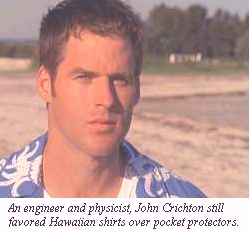


by Norman Dimitrios
March 14, 1999
On the afternoon of March 10, IASA Commander John Robert Crichton, Jr. fired up the engines of his experimental space craft and flew into oblivion. Four days later, even IASA has given up hope of finding Crichton, agreeing that by now, wherever he is, his craft will have run out of breatheable air. It is unthinkable, agree friends and family. All of his study and striving, all of his successes, culminating in one final failure.
Born 1964 in Raleigh, NC, John Crichton was the only child of the former Carolyn MacDougall and Captain Jack Crichton, a retired Navy test pilot and astronaut. Mrs. Crichton taught college chemistry in Raleigh; Annapolis, MD; and finally Orlando, FL, while her husband worked his way up in the US space program, getting on the short list of candidates for the Apollo 11 moon landing. Mrs. Crichton died in 1996.
Early on, young John seemed to combine his mother's science with his father's taste for danger. "We peeled off the cover of a croquet ball," remembers childhood friend Darius "DK" Kern. "We shaved the ball down a little, and glued on exploding caps. And then we put the cover back on and put it back in the set." They had no way of knowing, laughs Kern, that Crichton senior's astronaut friends would visit later that day for a friendly lawn game. "We got in some serious trouble for that one."
"He loved to know how things worked," said Jack Crichton in an interview today. "He was always tinkering." John worked part-time at a local airfield, fixing light aircraft engines, through high school. "Of course I taught him to fly a plane," said his father. "If I hadn't, he'd have gone off and taught himself."
It was no surprise, then, when Crichton junior went to M.I.T., where as a freshman project he built himself a radio that received only TV signals. "He used to listen to that contraption on headphones, instead of the regular radio," said Terry Servallis, his undergraduate roommate. "He never knew anything about music, but he could recite whole episodes of The A-Team." Crichton was a popular student, well-liked and athletic, an anomaly on a campus that has no competitive sports teams.
After an undergraduate degree in Aeronautics and Astronautics, in 1985, Crichton stayed on at M.I.T. for a Master's in Mechanical Engineering and a doctorate in Astrophysics. "He was in the 22nd grade before he stopped school," joked Kern. "I was at CalTech and he was at M.I.T., and we fired theories back and forth across the continent." It was this correspondence, cross-pollinating Kern's research in propulsion systems and Crichton's work in space plasma physics -- the study of particles outside of earth's atmosphere -- that spawned the Kern-Crichton Theorem in 1991. "After that, it was all about finding out whether we were right," said Kern. "He wanted to go into space and try it."
"It was all he talked about," said Alexandra O'Connor, his girlfriend at the time. "I was going into medical school, and John wanted to join IASA so badly. He had it all planned out." They broke up, she says, because they were both focused on their careers. "I think he wanted someone to support him, and I really needed to take care of myself." In 1992, IASA accepted Crichton's application, and trained him as a mission specialist.
 Naysayers now are wondering why Crichton was allowed to pilot his
own design, a procedure atypical in safety-conscious IASA. "He
charmed the right people," said a colleague, who asked to remain
anonymous. As a second-generation astronaut, he was well known
and highly regarded. "He always worked hard, but he had that golden
glow that got him the funding and the attention to get ahead."
Naysayers now are wondering why Crichton was allowed to pilot his
own design, a procedure atypical in safety-conscious IASA. "He
charmed the right people," said a colleague, who asked to remain
anonymous. As a second-generation astronaut, he was well known
and highly regarded. "He always worked hard, but he had that golden
glow that got him the funding and the attention to get ahead."
Sour grapes from a bitter co-worker? "No, it's true," laughed Dr. Kern. "He's an outgoing guy. He knows a lot of people, and fewer of them than you'd think are through his dad. He's just one of those people you remember. Was," added Dr. Kern, suddenly subdued.
Jack Crichton will mourn his son, but he doesn't think John would have any regrets. "John loved what he did," said his father. "It was his theory with DK, and they designed the module together. He knew all the risks, and all of the potential gains if the experiment worked. If he had to die, I'm glad it was doing the one thing he loved most in the world."

|

|